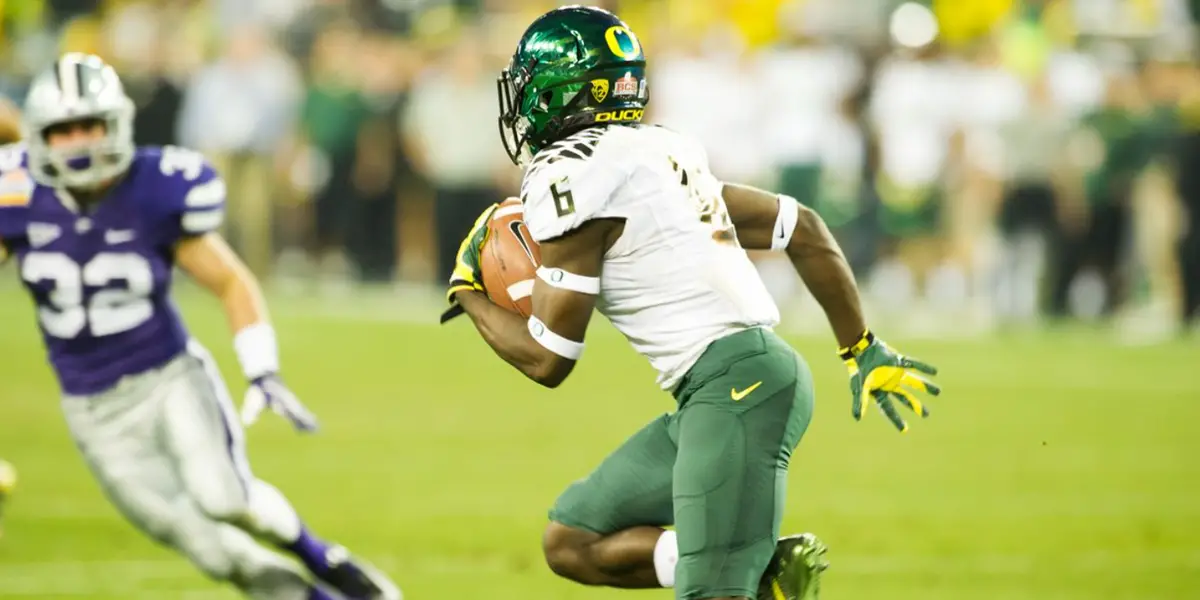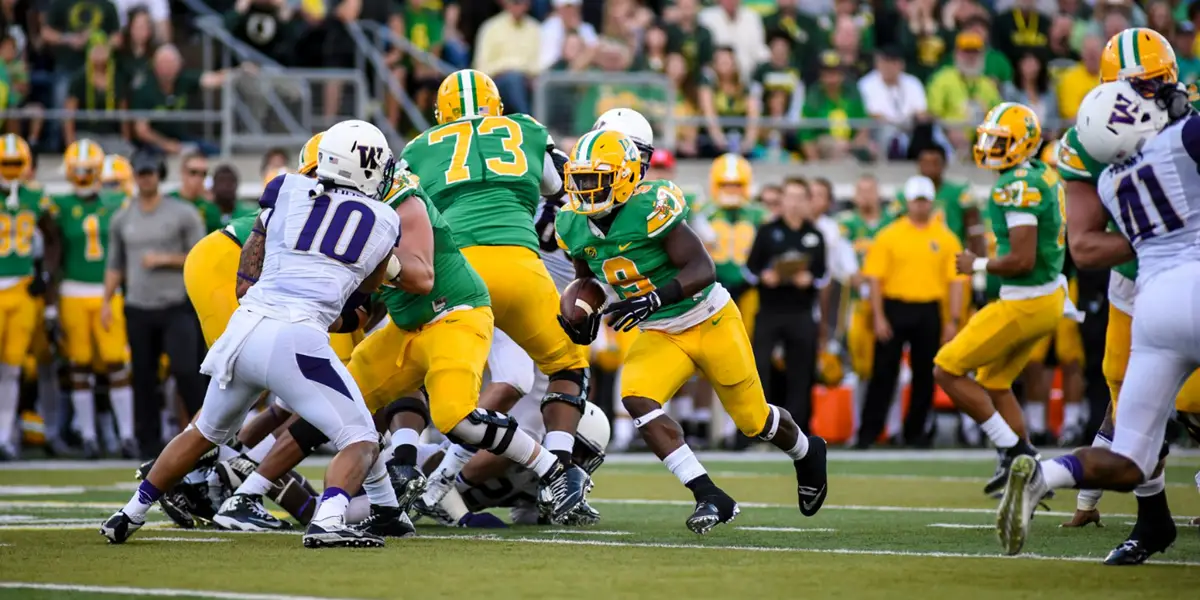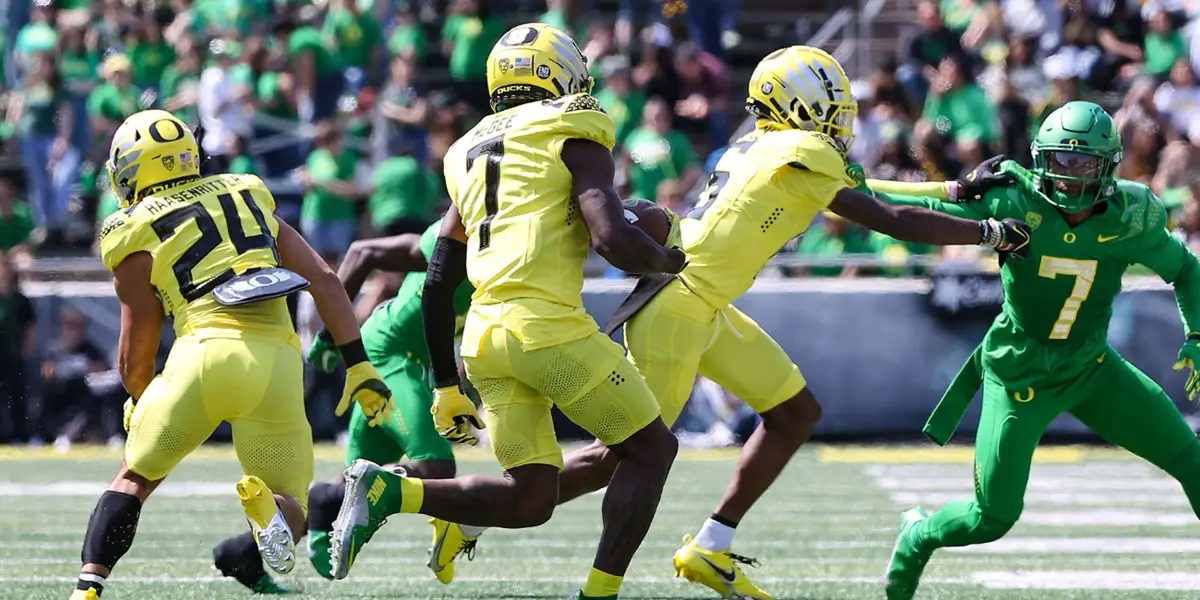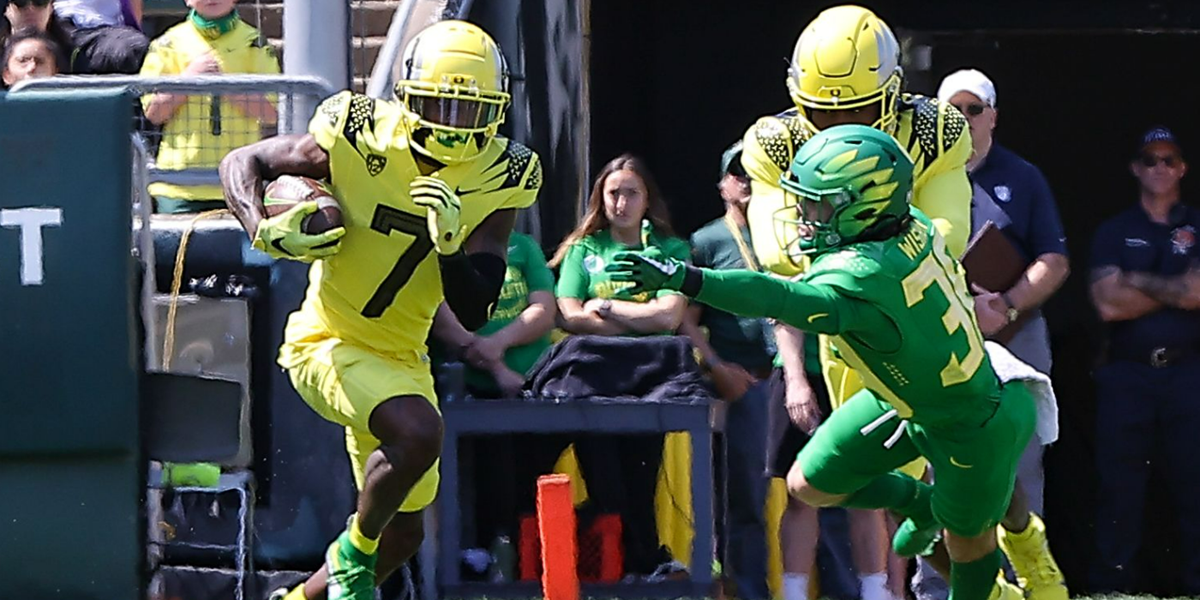The Oregon Ducks have become famous for their explosive skill position players. In recent years, running backs such as LaMichael James and Kenjon Barner, and receivers such as Josh Huff and Dillon Mitchell, have had noteworthy careers and become household names in the sport.
But as influential as these stellar receivers and running backs have been, perhaps Oregon’s most impactful offensive weapons as of late have been those who didn’t exactly have a position.
From De’Anthony Thomas to Jaylon Redd, the Ducks have consistently found ways to take advantage of their athletes’ unique skill sets, utilizing them in a variety of ways outside of their typical positional responsibilities. Running-back-turned-receiver Seven McGee could be the next position-less star, as his athleticism and explosiveness may very well be the key to Oregon’s offense taking off in 2022.
A History of “Slash” Stars
De’Anthony Thomas was a game-changer the second he set foot on campus. The diminutive dynamo had an otherworldly combination of speed, agility and acceleration. and although he was listed as a running back by the recruiting services, Chip Kelly and Mark Helfrich knew they would be doing Thomas and the team a disservice only utilizing him out of the backfield.

De’Anthony Thomas was a playmaker.
Thomas didn’t have the size to take the pounding of carrying the ball 20-30 times again. But he also was such a good athlete that the coaching staff had to get him in space as often as possible. So, especially as his career progressed, Thomas embraced the role of being a running back/receiver (a slash player).
He would still carry the ball between the tackles every now and then just to keep the defense honest, but he was largely used on outside running plays, as a receiver out of the backfield, and even as a traditional slot receiver. He caught screen passes, handled kickoff and punt returns, and essentially did everything except play quarterback on offense.
Thomas excelled so well in this role that Helfrich decided to try it again — this time with the less explosive but more powerful Byron Marshall. Marshall may not have been quite as physically gifted as Thomas, but he actually exceeded Thomas’s production. Marhsall pulled off the incredible feat of being a 1,000-yard rusher in one season and a 1,000-yard receiver the next.

Marshall was another jack of all trades.
Charles Nelson was the next “slash player” for the Ducks, and although he spent most of his offensive snaps at receiver, he was anything but a traditional player at the position. Nelson spent most of his time in the slot, doing everything from running long, downfield routes to catching quick passes and screens that were essentially running plays designed to get him the ball in space quickly. Like Thomas, Nelson was also a stellar return man, but unlike any of the aforementioned players, Nelson was so talented that he even switched sides of the ball and spent a season primarily playing safety.
Most recently, Jaylon Redd was used in many of the same ways as Nelson on offense. He took a number of snaps playing a traditional slot receiver role, but he also was the team’s number-one option in the screen and quick game, as he had the build and the skill set of a smaller running back.
McGee Is Next In Line
One of Dan Lanning’s biggest “commitments” in his inaugural recruiting class was getting Seven McGee to return to Oregon and exit the Transfer Portal. McGee is a very similar athlete to each of the aforementioned players, and if he is utilized correctly, he could have similar success.

McGee showed out in Oregon’s Spring Game.
McGee initially signed with Oregon as a four-star running back prospect, with blazing speed and top-end explosiveness. But just like Oregon’s previous slash stars, McGee is small, and his body may not hold up against the rigors of constant between-the-tackle runs.
McGee officially made the switch to wide receiver to preserve his body, but also to take full advantage of everything he brings to the table. If Kenny Dillingham is wise, he won’t have McGee abandon his old position entirely. He should still be used on perimeter runs out of the backfield, as no running back on the roster has as much big-play ability as McGee does.
But he also should be used often in the passing game, both vertically to stress defenses with his speed and in the quick game to utilize his running back skill set. If the Spring Game is any indication, the coaching staff seems to have a good handle on how to manage McGee’s role. McGee didn’t take any handoffs, but he was used any and everywhere in the passing game, hauling in a deep pass, taking a checkdown and creating yards after the catch, and even catching a touchdown in traffic.
He might not be a traditional running back or a receiver, but as long as he’s a playmaker in 2022, McGee’s position won’t matter. As long as Dillingham and Lanning continue to find ways to get the ball in his hands in any way possible, Oregon’s offense will have an explosive wrinkle this season.
Joshua Whitted
Morgantown, West Virginia
Top Photo by Gary Breedlove
Joshua is an adopted Duck fanatic, originally hailing from southwestern Pennsylvania. His love for the University of Oregon began as a young child when he became mesmerized by the flashy uniforms and explosive offenses of the Chip Kelly era, and now, he follows the team religiously. His fondest memory of the team is seeing De’Anthony Thomas race past Wisconsin defenders back in the 2012 Rose Bowl. A true football enthusiast, Joshua loves studying the intricacies of the game, and he aspires to become a professional sports journalist. Joshua now resides in Morgantown, West Virginia where he works in customer service. When he’s not watching Oregon replays, Joshua loves reading, writing, and spending time with his family. Contact: whittedjd@gmail.com


